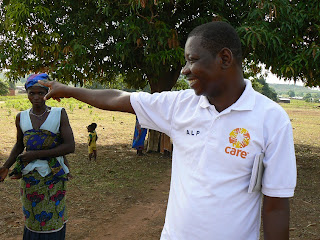Francis Npong, Nalerigu
 |
| Mr. Romanus Gyang CARE International ALP Manager |
As part of efforts to building local capacities to adapt to effects of climate change, CARE International-Ghana has adopted Digital Photo Story Telling (DPST) as a process for helping vulnerable communities to prioritize and share their climate change adaption strategies.
The Country manager for Care International-Ghana Adaptation Learning Programme (ALP) Mr. Romanus Gyang explained that DPST will be deplored by CARE International not only as a monitory and evaluation tool but also to access the impact of climate change on livelihoods and how communities were coping with or without interventions.
Mr. Gyang was addressing participants during the trainer of trainees DPST training workshop organized for some selected journalists from the Northern and Upper East regions at Nalerigu in the East Mampurusi District.
According to him, the aim of the training was to change how climate change adaptation issues are communicated. He observed that though climate change was critical social, economic, health and development issues, communicating climate change issues were poor among policy makers.
“Though climate change is most compelling issue today, communicating climate change issues among policy makers, research institutions and governments is appalling”, he said.
CARE International he said is exploring DPST as innovative ways to communicate the issues of climate change adaptation to community members and the general public.
“DPST is adopted by CARE International to explain the complicated subject using photos and mini films”, he said.
The Manager of ALP also stressed that climate change was a threat to livelihoods, economic development, food security, peace and stability in Africa and needed to be prioritized.
Digital Photo Story Telling is an ideal tool for not only monitory and evaluation but also effective communication tool that can support communities and vulnerable groups to effectively communicate their plight to the world, according to the facilitator and trainer, Ms. Hanne Tornager.
 |
| Ms. Hanne Tronager, CARE International Communication Consultant |
Ms. Tornager, a communication specialist and consultant for CARE Denmark ALP took the participants through to produce three digital photo stories in Zambulugu community. The DPST produced focused on deforestation, Village Savings and Loans Association (VSLA) and advocacy using local persons as guest artists.
The DPST produced are likely to be broadcast on social media by CARE International to reinforce the effects of climate change on the poor and rural folks.
The stories will also be used by local communities, civil society organizations and CARE to more easily share the views of often-marginalized and vulnerable people who are most impacted by a changing climate.
The digital stories (shown as mini films) can also create spaces for dialog with other community members, local civil society and government institutions in ways that other materials with similar information might not.
The DPST will support ALP’s M&E process by working with community members who have undertaken participatory exercises to identify and analyze their vulnerabilities and capacities to climate change impacts, plan their adaptation strategies and have started to implement them.
ALP will use its participatory monitoring methods to help the groups prioritize their top three adaptation topics - which give them most information on how much and how well they are succeeding to adapt to climate change. The first stories provide a “baseline” for them to record the most important aspect of adaptation that they want to explain, and track over the course of the project.
Stories may include their current and past situation, how the group feels the impacts of climate change in terms of livelihoods, socially, changes in risks and other change, what they are already doing about it, how and why, challenges and opportunities they face etc, according to what the group finds most important to tell. The group can then select up to 3 people who will represent them in the workshop to develop their story.
CARE International’s Climate Change Adaptation and Learning Programme (ALP) seeks to increase the capacities of vulnerable communities and households to adapt to the effects of climate change using what they called community based adaptation approach.
The community based adaptation approach hinged on four key elements; promoting climate resilient livelihoods strategies, building capacities of local NGOs and local public institutions, disaster risk reduction strategies and addressing the underlying causes of vulnerability through social mobilization for empowerment and advocacy to influence policies implementations.
 |
| Journalists: Right to Left: Kassim Abdallah and Ebo Bruce Quansah |
The Care ALP’s overarching goal is also to increase the capacity of vulnerable households in Sub-Saharan Africa to adapt to climate variability and change. It is being implemented in 40 communities in Ghana, Niger, Mozambique and Kenya by CARE International and its local partner organizations.
ALP uses Community Based Adaptation (CBA) as its main approach - developing innovations in CBA, facilitating learning from experiences and advocating for CBA in local, national to global policies and plans.
No comments:
Post a Comment